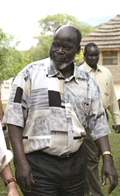
Sudan: The Shadow of a Death
The death on July 30th of the southern Sudanese leader John Garang de Mabior endangers a fragile and incomplete accord to end the 1983-2005 North-South civil war and complicates further efforts to bring to an end the conflicts in the four provinces of
Garang had enemies both among the northerners he had long fought but also among rivals for leadership among southern groups. It was only a month ago, July 9th, that John Garang was installed as first vice-president of Sudan in a North-South power-sharing agreement, but the practical role of Garang and other southerners in the government, the administration and the army had not been worked out and may now be called into question.


